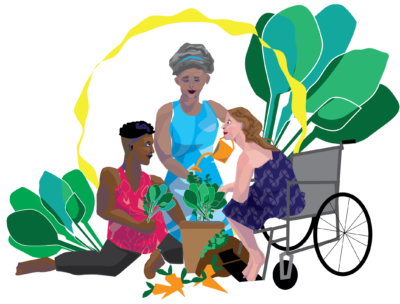Our Vision

Current State of Play
Women with HIV occupy spaces where the impacts of racism, patriarchy, transphobia, trauma, poverty and HIV intersect. While economic insecurity can create vulnerability to acquiring HIV in the first place, for people diagnosed with HIV, our diagnosis can lead to a lifetime of poverty as a result of harmful policies. Poverty erects significant barriers to health care, while undermining the dignity, safety and self-determination of people living with HIV and increasing vulnerability to criminalization and interpersonal and structural violence.
Women and people of trans experience living with HIV are more likely than men to live below the federal poverty line (FPL), yet they are also more likely to hold significant caretaking responsibilities for chosen and extended family members. People of trans experience face persistent gender-based discrimination, surveillance and hyper-criminalization that contribute to higher rates of unemployment and poverty, the effects of which are amplified for people of color. Having a criminal record may erect an insurmountable barrier to finding and maintaining employment as well as to accessing safety net services, such as SNAP (food stamps), Temporary Aid for Needy Families (TANF) and subsidized housing. Without intervention, these inequities will persist and grow, restricting agency and basic quality of life for the majority of people living with HIV (PLHIV) who are people of color, low-income, and/or LGBTQ.
For many living with HIV, their diagnosis has been a sentence to a lifetime of poverty, because eligibility for life-sustaining programs such as the AIDS Drugs Assistance Program (ADAP), some medical care services and housing programs require enrollees to earn less than a specified amount of money annually to qualify for benefits. Under these “income eligibility caps,” PLHIV are forced to keep their incomes below a certain level to maintain access to life-extending medications, stable housing and other services. As a result, individuals who attempt to earn more to support themselves and their loved ones may be penalized and excluded from care, as many employers still do not offer affordable, comprehensive health insurance coverage to their employees. This is an outrageous violation of human rights, requiring people to be poor in order to obtain necessary health care and services.
We strive to uphold the human rights and agency of PLHIV by removing barriers to economic security.
At the federal level, we support:
At the federal level, we oppose:
At the state level, we support:
Resources:
- Economic Justice
- Preserving the Essential Safety Net
- Coalition for Human Needs – Protecting Basic Needs Program 2018
- Center for Budget and Priorities – Impact of the Safety Net: State Fact Sheets
- National Women’s Law Center – Cutting Programs for Low-Income People Especially Hurts Women and Their Families, March 2017
- Employment for PLHIV
- Working Positive Coalition – Recommendations to Increase Employment Opportunities for People Living with or at Greater Risk for HIV
- State & Local Ban the Box
- National Employment Law Project – Ban the Box: US Cities, Counties, and States Adopt Fair Hiring Policies
- Inclusive Family, Paid Sick and Safe Leave
- Family Values at Work – Resources and Toolkit
- Center for American Progress, Family Values at Work, Forward Together, A Better Balance – Making Paid Leave Work for Every Family
Take Action!
- Demand your legislators oppose cuts to federal essential safety net programs that ensure a basic quality of life for people living with and vulnerable to HIV.
- Advocate for policies that remove barriers to and create employment opportunities for PLHIV
- Work with state and local advocates to pass legislation that removes barriers to employment and economic security for people who have interacted with the criminal justice system
- Work with state and local advocates to pass inclusive family, and paid sick and safe leave policies that provide legal protection for PLHIV caring for chosen family and extended family, and support survivors of intimate partner violence and sexual assault.


